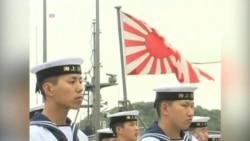TOKYO —
Japan’s government says it plans to allow its self-defense forces to play a greater role in global security. Currently Japan's ‘pacifist’ constitution, written under American supervision after World War II, allows the country's armed forces to be used only for defensive purposes to preserve national security. Tokyo's current plans have prompted anger in China, however, which is engaged in a heated territorial dispute with Japan.
On Friday under the glare of the media, a group of more than 100 Japanese lawmakers visited Tokyo's Yasukuni shrine, which honors Japan’s war dead, including several convicted war criminals.
The visit prompted anger in China. Hua Chunying, spokesperson for the Chinese Foreign Ministry, said, "once again China urges Japan to abide by its commitment and promise to deeply examine history and take real measures to win the trust of Asian neighbors and the international community."
The tension comes as the two countries dispute the ownership of offshore islands known as the Senkaku in Japan and the Diaoyu in China.
Opening a new session of Japan’s parliament last week, Prime Minister Shinzo Abe made national security a central pillar of his policy reform.
Abe said Japan must not look away from the reality of an increasingly severe security situation in the region.
"I will proceed with a realistic security policy and diplomacy," he added.
Japan has developed what it terms "self-defense forces," but relies on its alliance with the United States for its overall security.
Nationalist author Hideaki Kase said that reliance, though, is out of date.
“We are now witnessing rising American isolationism. So we can no longer place 100 percent trust in U.S. willingness to defend us,” he said.
Compared to the U.S., China’s relative military power is expanding rapidly, said Shinichi Kitaoka, Japan's former ambassador to the U.N. and key advisor to Abe.
“Not only the rapid rise of their [China’s] military budget. Their activities are sometimes irregular, and it seems to us challenging to the status quo by force, which is very dangerous,” said Kitaoka.
Japanese warships are currently deployed in anti-piracy operations off Somalia. Should allied warships come under attack, Japan’s constitution forbids its forces from coming to their aid.
Kitaoka said Japan must re-interpret its constitution and lift the self-imposed ban on the right to exercise collective self-defense.
“If we have to respond to all the threats by individual effort alone, then we would probably have to have a big military," he said. "So the collective right of self-defense is not dangerous, rather it is a safer way to peace.”
But recent opinion polls show just half of Japanese voters favor revising the country's pacifist constitution, far less than the 90 percent of lawmakers who desire to do so.
Tokyo resident Takako Tsuchida is among those who opposes changing the constitution. Tsuchida said she is 100 percent against all war.
"So if you change the constitution," she said, "I worry that there’s a possibility that war would happen again, so that’s why I’m against it."
Abe insists that allowing Japan to play a greater role in global security, however, will promote regional peace. But fear persists among its neighbors that Japan has yet to heed the lessons of its past.
On Friday under the glare of the media, a group of more than 100 Japanese lawmakers visited Tokyo's Yasukuni shrine, which honors Japan’s war dead, including several convicted war criminals.
The visit prompted anger in China. Hua Chunying, spokesperson for the Chinese Foreign Ministry, said, "once again China urges Japan to abide by its commitment and promise to deeply examine history and take real measures to win the trust of Asian neighbors and the international community."
The tension comes as the two countries dispute the ownership of offshore islands known as the Senkaku in Japan and the Diaoyu in China.
Opening a new session of Japan’s parliament last week, Prime Minister Shinzo Abe made national security a central pillar of his policy reform.
Abe said Japan must not look away from the reality of an increasingly severe security situation in the region.
"I will proceed with a realistic security policy and diplomacy," he added.
Japan has developed what it terms "self-defense forces," but relies on its alliance with the United States for its overall security.
Nationalist author Hideaki Kase said that reliance, though, is out of date.
“We are now witnessing rising American isolationism. So we can no longer place 100 percent trust in U.S. willingness to defend us,” he said.
Compared to the U.S., China’s relative military power is expanding rapidly, said Shinichi Kitaoka, Japan's former ambassador to the U.N. and key advisor to Abe.
“Not only the rapid rise of their [China’s] military budget. Their activities are sometimes irregular, and it seems to us challenging to the status quo by force, which is very dangerous,” said Kitaoka.
Japanese warships are currently deployed in anti-piracy operations off Somalia. Should allied warships come under attack, Japan’s constitution forbids its forces from coming to their aid.
Kitaoka said Japan must re-interpret its constitution and lift the self-imposed ban on the right to exercise collective self-defense.
“If we have to respond to all the threats by individual effort alone, then we would probably have to have a big military," he said. "So the collective right of self-defense is not dangerous, rather it is a safer way to peace.”
But recent opinion polls show just half of Japanese voters favor revising the country's pacifist constitution, far less than the 90 percent of lawmakers who desire to do so.
Tokyo resident Takako Tsuchida is among those who opposes changing the constitution. Tsuchida said she is 100 percent against all war.
"So if you change the constitution," she said, "I worry that there’s a possibility that war would happen again, so that’s why I’m against it."
Abe insists that allowing Japan to play a greater role in global security, however, will promote regional peace. But fear persists among its neighbors that Japan has yet to heed the lessons of its past.





